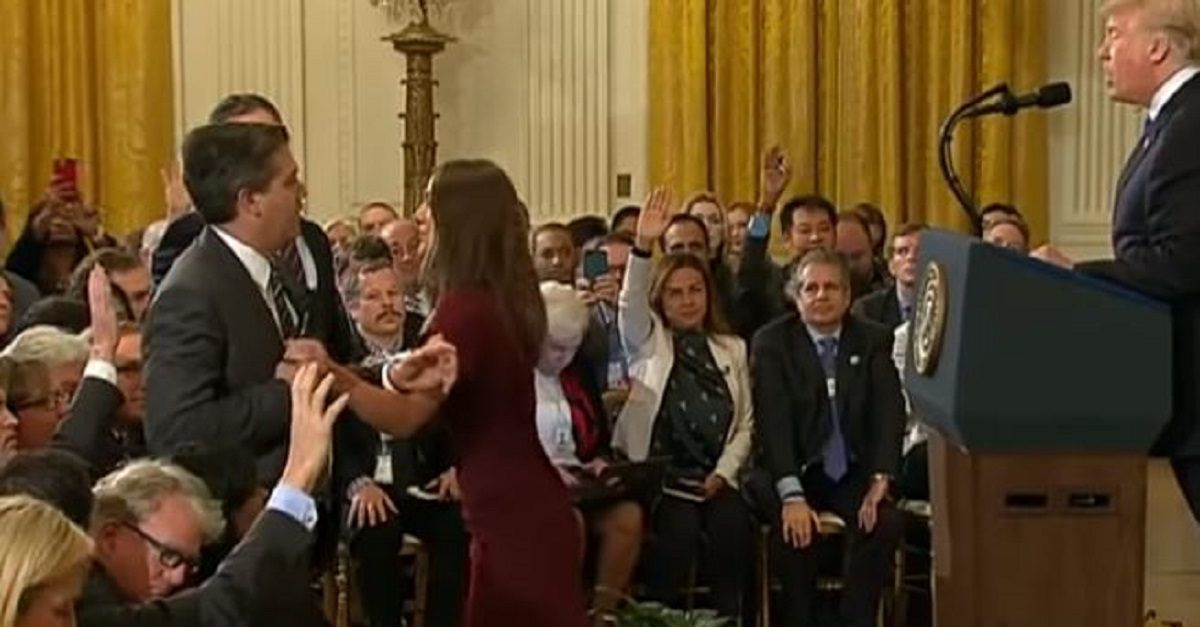
ABA Legal Fact Check debuted in August 2017 and is the first fact check website focusing exclusively on legal matters. This article has been republished with permission.
On Nov. 7, the U.S. Secret Service stopped CNN reporter Jim Acosta from entering White House grounds and took his media credentials after an incident earlier that day during President Donald Trump’s news conference. A video of the encounter appeared to show that Acosta brushed up against a White House intern who was dispatched to take away his microphone to keep him from asking further questions. “We will not tolerate the inappropriate behavior clearly documented in this video,” White House Press Secretary Sarah Sanders tweeted later that night. Six days later, CNN sued, seeking Acosta’s reinstatement. Who has the strongest legal case?
Shortly after Acosta’s White House pass was suspended, President Trump threatened to pull more reporters’ credentials. While presidents have squared off against individual reporters in the past, media credentials are rarely revoked for a working reporter who regularly covers the White House. Foreign Policy magazine, in a 2010 article, detailed the history of past White House battles over media credentialing.
On Capitol Hill, the independent Standing Committee of Correspondents, comprised of gallery members, serves as the gatekeeper for congressional press credentials. Congress established the system, which dates to the late 1870s, to address potential concerns that Congress might infringe upon the rights of a free press or only allow for favorable news coverage. As a Congressional Research Service report observed in 2017, congressional “press galleries have retained similar structures and practices over the years.”
To get the media credential that allows a reporter to regularly cover the White House, known as a “hard” White House pass, typically a journalist needs to reside in the Washington, D.C. area, and be credentialed for the House and Senate galleries. Additionally, the individual also needs to reside in the Washington, D.C. area, and report from the White House on a regular basis. The White House Press Office then forwards the application to the Secret Service for a security check, including a background investigation conducted by the FBI. The decision to issue a pass rests solely with the Secret Service, which is charged with protecting the president and his family.
A half century ago, the Secret Service periodically denied media credentials for niche or alternative media. This led to federal lower court rulings in the 1970s that tested whether the White House had the authority to deny a “hard pass” for a reporter and on what grounds.
The cases never reached the U.S. Supreme Court. But lower court judges cited both First and Fifth Amendment grounds in ruling for reporters and against the Secret Service. CNN’s lawyers cited similar First and Fifth Amendment grounds in arguing on behalf of Acosta.
In two cases, first considered by a U.S. District Court in Washington, D.C., Robert Sherrill, a correspondent for The Nation, and Thomas Forcade, a reporter for Alternative Press Syndicate and later founder of High Times magazine, were denied passes for security reasons because of past conduct, according to the Secret Service. But the trial judge found that the Secret Service violated the journalists’ First and Fifth Amendment rights, including denying them “due process” to rebut the evidence against them. The government then appealed (Forcade later dropped out of the case).
A three-judge panel for the U.S. Court of Appeals for the D.C. Circuit unanimously ruled in 1977 that the government had the limited right to deny a media pass. In Sherrill’s case, the panel said, the Secret Service failed to articulate and publish “an explicit and meaningful standard governing denial of White House press passes for security reasons, and to afford procedural protections.”
“We remand that portion of the District Court’s judgment requiring appellants to develop ‘narrow and specific standards’ for press pass denials in order that this requirement may be modified in accordance with this opinion,” the judges said.
But before finishing the opinion, the panel added this sentence that could be relevant in the suit involving Acosta: “We have no occasion to consider what procedures must be employed in the revocation, for security reasons, of an already-issued White House press pass.”
Lawyers for CNN said the defendants’ justification for impeding Acosta’s First Amendment rights were “hollow and hardly sufficiently compelling.” They cited the president’s own words when he said later that Acosta’s encounter “wasn’t overly, you know, horrible.” So unless the courts apply a different legal standard today than the appeals court cited 41 years ago, it would appear that the Trump administration has a tough legal road ahead.
Read more of ABA’s Legal Fact Check series here.
[Screengrab via FOX Business]